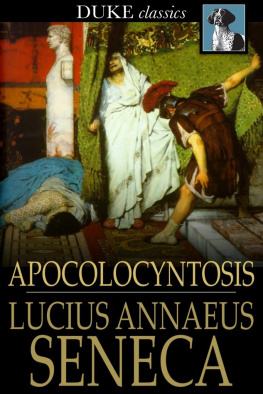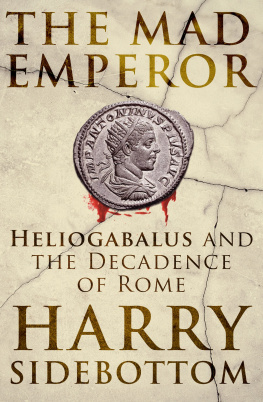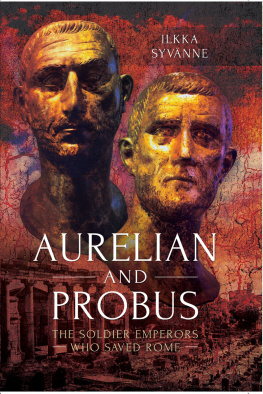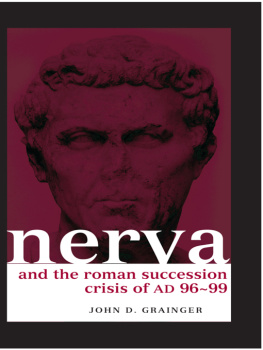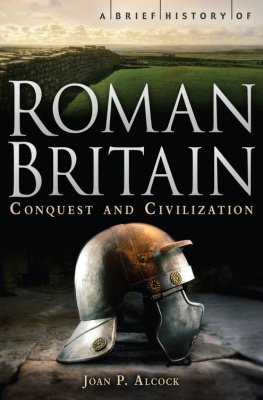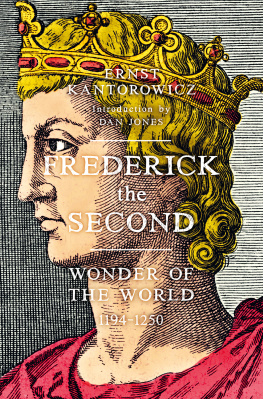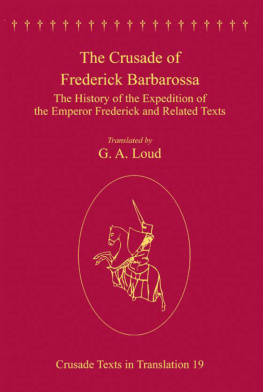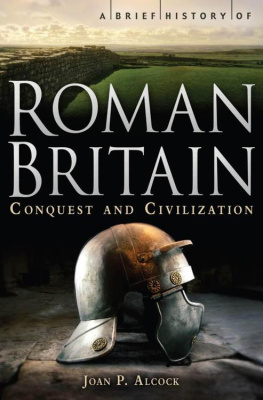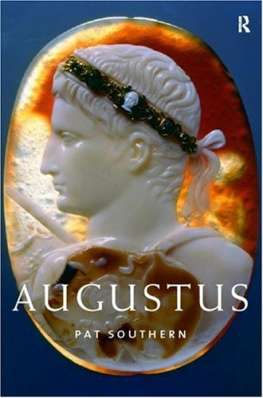The ancient Sibylline Books had predicted that Rome would last 1,000 years. The millennial celebrations had already been held (AD 248) and the anxious population of the empire, shaken by civil wars and battered by the Gothic incursions, fearfully awaited the worst. Then the barbarians poured across the frontiers.
Coin photo: British Museum.
Above: Reconstruction of Aurelians appearance from surviving coin profiles, accounts by contemporary writers and similarities to third-century emperors. Original watercolour for this book commissioned by the author from the portrait artist David Greenwood (Crowthorne, Berkshire, UK).
John F. White
First published in Great Britain in 2015 by
Pen & Sword Military
an imprint of
Pen & Sword Books Ltd
47 Church Street
Barnsley
South Yorkshire
S70 2AS
Copyright John F. White 2015
ISBN: 978 1 47384 569 5
PDF ISBN: 978 1 47384 479 7
EPUB ISBN: 978 1 47384 477 3
PRC ISBN: 978 1 47384 478 0
The right of John F. White to be identified as the Author of this Work has been asserted by him in accordance with the Copyright, Designs and Patents Act 1988.
A CIP catalogue record for this book is available from the British Library
All rights reserved. No part of this book may be reproduced or transmitted in any form or by any means, electronic or mechanical including photocopying, recording or by any information storage and retrieval system, without permission from the Publisher in writing.
Typeset in Ehrhardt by
Mac Style Ltd, Bridlington, East Yorkshire
Printed and bound in the UK by CPI Group (UK) Ltd,
Croydon, CRO 4YY
Pen & Sword Books Ltd incorporates the imprints of Pen & Sword
Archaeology, Atlas, Aviation, Battleground, Discovery, Family
History, History, Maritime, Military, Naval, Politics, Railways, Select,
Transport, True Crime, and Fiction, Frontline Books, Leo Cooper,
Praetorian Press, Seaforth Publishing and Wharncliffe.
For a complete list of Pen & Sword titles please contact
PEN & SWORD BOOKS LIMITED
47 Church Street, Barnsley, South Yorkshire, S70 2AS, England
E-mail:
Website: www.pen-and-sword.co.uk
Contents
List of Maps
Acknowledgements
I acknowledge gratefully the following aid and assistance, and permissions to quote extracts from copyright work:
Janet Larkin at the British Museum for her aid in providing examples of Roman coins for physical examination, and also photographs of the same coins.
The staff at the Joint Library of the Hellenic and Roman Societies, in Malet Street, London, for all their help and knowledge.
Sheila Longley, who worked her way energetically through a preview manuscript, despite the fact that she had far better things to do.
Dr St John Stephens for showing me his collection of slides of the eastern city of Palmyra, and granting permission to reproduce them.
Ian Hughes, for providing all the maps and diagrams with speed and skill.
Dane of Wildwinds.com for granting permission to reproduce certain coins, as listed under copyright permissions.
The Trustees of the British Museum, for permission to reproduce the photographs of Roman coins.
Copyrights are acknowledged as follows:
Maps and diagrams: Ian Hughes.
General photographs: Nos. 1, 2, 5, 6, 7, 8, 9 John F. White.
Coin photographs (plate section): Nos. 10, 11, 12, 13, 14, 15, 17, 18, 20, 21, 23, 24, 25, 26 British Museum. Nos. 16, 19, 22 courtesy of CNG Coins and wildwinds.com.
Drawings of Aurelians Temple of the Sun: Nos. 27, 28 RIBA Library Drawings and Archives Collections.
Picture No. 29 Giovanni DallOrto 2011, published under the Wikimedia Creative Commons licence.
This book is the successor to my original Restorer of the World book, and has been substantially revised, rewritten and augmented with much new information.
John White, Wokingham, 2014
A Note about Footnotes
T he presentation of sources is always a difficult problem. If the author supplies many citation footnotes, he pleases researchers but irritates readers. If he does not supply footnotes, the position is reversed.
The first edition of this book was intended originally to popularize the emperor Aurelian for a non-academic readership. However, it became in demand by many academic readers. This has created a difficulty: I do not want to discourage non-academic readers with the tiresome need to keep flicking backwards and forwards to a list of references that provide greater details of that which I have written. On the other hand, I am aware that academic readers want to be able to track back to my sources.
As a compromise, which doubtless will please no one, I have chosen to restrict my footnotes almost entirely to references to the literature. There will be very few explanatory details found in the footnotes; non-academic readers need not feel that they are missing anything by ignoring the footnotes completely.
In addition, standard reference works, or ancient chronicles, that will be used in almost every chapter are simply clustered together at the beginning of (The Start of Recovery), note 1, as Principal Original Sources.
Sources in English, or English translation, will be preferred where available, again for the benefit of lay readers.
John White
Introduction
About the Emperor Aurelian
A sk any well-informed layman in Britain to name a few Roman emperors, and most will respond immediately with Julius Caesar (who was not, in fact, an emperor, but a dictator), Augustus, Nero and Constantine. With a little more reflection, and depending on how much of the marvellous television adaptation of Robert Graves semi-fictional work I, Claudius they can recall, they might also be able to name Claudius, Caligula and Tiberius. A few might have heard of that remarkable administrator, the emperor Diocletian, while the names of Marcus Aurelius and his son Commodus will be familiar to those who have seen the popular film Gladiator.
Not one of these laymen will know the name of the emperor Aurelian (AD 270275), not to be confused with the philosopher-emperor Marcus Aurelius. Yet if it had not been for the actions of this one man often acclaimed justly by modern historians of ancient Rome as a superman the Roman Empire would probably have split asunder by the end of the third century AD, leaving a very different heritage from that which so shapes our lives today, the Christian-Roman European culture that has for so long held sway.
The ancient Roman author of the biography of Aurelian found in the Augustan Histories has this to say:
When we had come to the Temple of the Sun consecrated by the emperor Aurelian, he [the prefect of the city of Rome] asked me who had written up the life of that man. When I replied none was known by me in Latin, but some in Greek, the revered man poured out the anguish of his groan through these words: Therefore Thersites, Sinon and other such monsters of antiquity both we know well and of whom posterity will speak; shall the divine Aurelian, most illustrious emperor, most stern general, through whom the whole world is restored to the Roman name, not be known to our descendants? May God avert this madness!
And so, he informs us, the Latin biographer began his work (for its value, see below), yet posterity does indeed remain generally ignorant of Aurelians achievements as Restorer of the World and his acclamation as a god. His accomplishment is at least the equal of Augustus, who created the Roman Empire as we know it, for Aurelian had to stitch the empire back together after the disruptions caused by endemic civil wars and seemingly interminable and unstoppable invasions from outside the Roman frontiers by barbarians seeking loot.



